When we think of academic high schools, images of rigorous academic programs and high-achieving students often come to mind. While these institutions are indeed known for their academic excellence, there's another aspect that sets them apart – the cultivation of an inclusive culture among students.
In this blog post, we'll explore how best academic schools go beyond academics to create a welcoming and diverse environment.
Embracing Diversity from Day One
Top academic schools understand the value of diversity and make it a priority from the moment students step through the doors. These schools actively seek students from various backgrounds, cultures, and experiences, creating a melting pot of perspectives that enrich the entire learning environment.
The emphasis is not only on academic prowess but also on fostering a community where everyone feels seen, heard, and valued.
Building Bridges Through Collaborative Learning
One of the secrets behind the success of top academic high schools in fostering inclusivity is their commitment to collaborative learning. Students are encouraged to work together on projects, share ideas, and learn from each other's strengths. This not only enhances their academic experience but also promotes a sense of unity among students.
When everyone contributes and collaborates, it breaks down barriers and creates a supportive atmosphere that extends beyond the classroom.
Inclusive Extracurricular Activities
Extracurricular activities play a pivotal role in shaping a student's overall experience in high school. Top academic schools go the extra mile by offering a diverse range of clubs, sports, and organisations that cater to various interests.
Whether it's a robotics club, a debate team, or a cultural exchange program, these schools ensure that every student has an opportunity to explore their passions and find like-minded peers. In doing so, they foster a sense of belonging that goes beyond academic achievement.
Mentorship Programs: Nurturing Potential
Creating an inclusive culture involves more than just providing academic resources; it requires personal attention and mentorship. Top academic high schools often have mentorship programs in place where older students or faculty members guide and support younger peers.
This not only helps in academic matters but also provides a safe space for students to share their concerns, dreams, and aspirations. Mentorship programs contribute significantly to creating a nurturing environment where everyone feels supported in their individual journeys.
Celebrating Differences: Cultural Events and Awareness Programs
In the pursuit of an inclusive culture, the best academic schools recognise the importance of celebrating differences. Cultural events, awareness programs, and diversity workshops are common occurrences in these institutions. Students are exposed to various cultural practices, traditions, and perspectives, fostering a deep understanding and appreciation for diversity.
By acknowledging and celebrating differences, these schools create an atmosphere where uniqueness is not just accepted but celebrated.
Open Dialogue: Creating a Platform for Voices
Last but certainly not least, top academic high schools prioritise open dialogue. Creating platforms for students to express their thoughts, concerns, and suggestions is crucial to maintaining an inclusive culture.
Whether it's through student forums, town hall meetings, or online platforms, these schools ensure that every student has a voice. This open communication fosters a sense of ownership and belonging, making students active participants in shaping the culture of their school.
Conclusion
Academic high schools are not just about academic excellence; they are about fostering an inclusive culture that goes hand in hand with intellectual growth. By embracing diversity, encouraging collaboration, offering inclusive extracurricular activities, providing mentorship, celebrating differences, and promoting open dialogue, these schools create an environment where every student feels valued.
It's a holistic approach to education that prepares students not only for academic success but also for a future where diversity and inclusion are paramount.


No comments yet